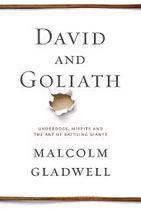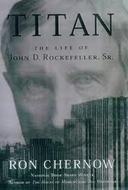 Being a fan of Malcolm Gladwell's other books, I was excited to read his latest David and Goliath: Underdogs, Misfits, and the Art of Battling Giants. I found it really engaging, and the author kept true to his established style of surprising the reader with interesting and thought-provoking stories and questions. The beginning of the book is about the biblical David vs. Goliath story, and it exposes some myths we hold as a culture about what it means to be an underdog and potentially how wrong we are about the balance of power. Gladwell points out some important ways in which underdogs routinely are more powerful and skilled than their giant opponents. However, that's pretty much where the title theme of the book stops, as I found the rest of it to be a lot more about overcoming difficulties and how "desirable difficulties," like mid-sized classrooms, dyslexia, and childhood bereavement can actually make people stronger and much more accomplished. Each of the book's chapters focuses on a few specific people's lives, and these stories, taken from different points in history, show various ways in which people over time responded to similar difficulties. I liked how all the major parts of the book built on each other in this regard. The main evidence of the book comes from research studies and the many interviews that the author conducted with the main characters of the stories he recounts. I wondered a lot about how the ideas of unexpected strengths and weakness can apply to the world of start-up Davids vs. big company Goliaths. What are the strengths and weaknesses that we traditionally ascribe to each but which might indeed be backwards? I definitely recommend this book to anyone who likes Gladwell's other writing and especially people interested in education, criminal law, learning disorders, and history.
2 Comments
 Again at Ryan Holiday's suggestion, I recently finished reading Titan: The Life of John D. Rockefeller, Sr. by Ron Chernow. He called it one of his 3 best books of 2012 (he read over 200 in 2012). Here's what he had to say about it: "A biography has to be really good to make read you all 800 pages. To me, this was one of those books. Since reading it earlier this year, I've since found out it is the favorite book of a lot of people I respect.... [T]he main lessons you ... take away from someone like Rockefeller would not be business, but life lessons.... I found Rockefeller to be strangely stoic, incredibly resilient and, despite his reputation as a robber baron, humble and compassionate. Most people get WORSE as they get successful, many more get worse as they age. Rockefeller did neither of these things, he grew more open-minded the older he became, more generous, more pious, more dedicated to making a difference." I definitely got the same impression. The author initially did not want to write this biography because Rockefeller had been written about so much before. However, in beginning his research, he found that few writers really got to know John D. the person, and characterizing his human part was this writer's goal from the start. I found that Chernow presented the facts simply and did not express judgment as to the morality of various monopolizing business actions (presenting both sides of the story); instead, he focused on the person and his evolution throughout his life. Below are my full notes on the book. A few big themes and takeaways:
|
Archives
June 2024
Categories
All
Subscribe |
 RSS Feed
RSS Feed
